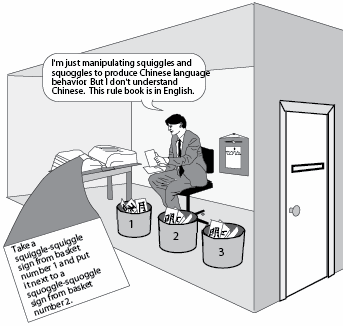The Chinese Room Argument was proposed by John Searle (1980 & 1990):
Imagine that a man who does not speak Chinese sits in a room and is passed Chinese symbols through a slot in the door. To him, the symbols are just so many squiggles and squoggles. But he reads an English-language rule book that tells him how to manipulate the symbols and which ones to send back out.

To the Chinese speakers outside, whoever (or whatever) is in the room is carrying on an intelligent conversation. But the man in the Chinese room does not understand Chinese; he is merely manipulating symbols according to a rulebook. He is instantiating a formal program, which passes the Turing test for intelligence, but nevertheless he does not understand Chinese. This shows that the instantiation of a formal program is not enough to produce semantic understanding or intentionality.

Note: for more on Turing tests, see Map 2. For more on formal programmes and instantiation, see the "Is the brain a computer arguments?" on Map 1, the "Can functional states generate consciousness?" arguments on Map 6, and "Formal systems:an overview" on Map 7.
Intentionality: The property (in reference to a mental state) of being directed at a state of affairs in the world. For example, the belief that Sally is in front of me is directed at a person, Sally, in the world.
Although there are important and subtle distinctions in the definitions of the words, intentionality is sometimes taken in this debate to be synonymous with representation, understanding, consciousness, meaning, and semantics.